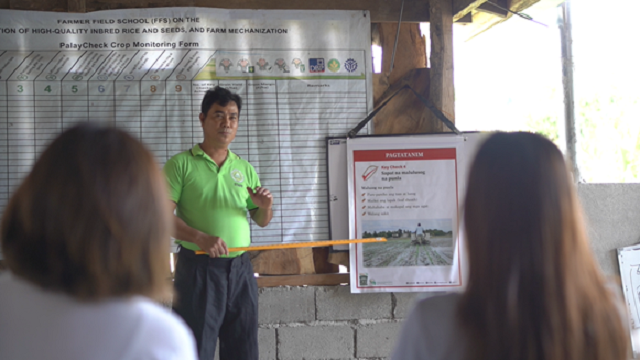
Farmer-graduates of the LPJ3D’s Integrated Farm School are possibly one of the happiest farmers in Quirino.
It’s easy to see why. Jane Laguna, one of the Farmer Field School’s graduates, increased her yield by 50 sacks after using the certified inbred seeds from the Rice Competitiveness Enhancement Fund (RCEF) Seed Program and following the PalayCheck taught in the LPJ3D’s Integrated Farm School.
Owned by Diosdado “Sir Dado” Estocapio Jr., the farm school created through the assistance of RCEF Rice Extension Services Program, is dedicated to improving farmers’ capacity in far-flung communities, particularly in the indigenous people communities.
“As a farmer-leader, I assume the responsibility of capacitating my fellow rice farmers so they can contribute more to the improvement of our locality and nearby areas,” he said.
From being a learning site of the Agricultural Training Institute (ATI) in 2016, it progressed as a Farmer Field School (FFS) in 2019 and encountered challenges in fulfilling its assumed role.
His knowledge was limited to his own farming experience and learnings from previous training. Also, as an Ilocano, he experienced communication barriers as many of his fellow farmers were from the Ifugao tribe who spoke Tuwali and Ayangan.
“I needed to have a better understanding of the topics I deliver during lectures. Equally important, I had to communicate effectively with my trainees,” Sir Dado shared.
“At the end of the day, my fulfillment lies in seeing the farmers improve their practices after training, and even better, if their yields increase. That is the main indicator that I have done my job well and that the farm school has been effective,” he added.
Motivated by this mission, he sought assistance from various agencies to enhance his capacity. He attended training on the PalayCheck System at the ATI, participated in seminars organized by the local government unit, and joined School-on-Air programs.
“In preparation for my first batch of FFS in 2021, RCEF staff visited my farm school. They brought with them various materials intended for the school and participants,” Sir Dado recalled.
Overwhelmed by the support, he accepted the materials, which included a PalayCheck flipchart, flashcards depicting insects and rice diseases, PalayCheck primers, posters, and leaflets on rice farming, and science and technology magazines of the Philippine Rice Research Institute.
Although concerned if all his participants would understand the materials in Tagalog, Sir Dado found that the visual aids with pictures and graphics are understandable to his trainees even without reading the text.
Moreover, these materials not only improved his understanding of the PalayCheck System and rice management related to pests and diseases but also enhanced his lecture delivery.
Sir Dado also learned the languages spoken by the IP farmers through regular conversations. He expressed gratitude for those who could understand Ilocano and served as interpreters for terms he was unfamiliar with.
“I enhanced their learning through hands-on activities and practical application of the topics discussed,” he added.
The passion of Sir Dado to help enhance the knowledge of indigenous farmers is making a significant impact on the agricultural community.
As Jane Laguna said, “Despite not completing my elementary education, I have learned a lot from the training, and I am now capable of assisting my husband in our rice field.”
To date, Sir Dado’s farm school has successfully graduated 475 students.




